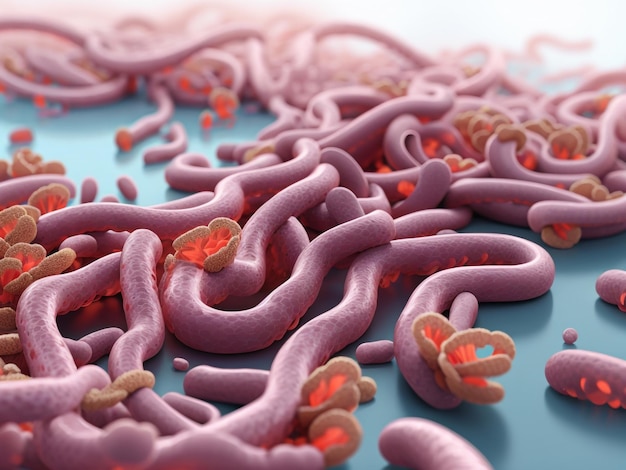
Intermittent fasting is not just about losing weight; it’s a lifestyle that can play a big role in improving your overall health, especially your gut health. This way of eating involves switching between periods of eating and fasting, which helps manage weight and influences your gut bacteria’s makeup and function.
More and more, we’re learning about how our diet, fasting, and gut health are connected. It’s becoming clear that when we eat can be as important as what we eat.
Our bodies host a complex community of bacteria, viruses, fungi, and other microorganisms known as the microbiome, with a large portion of these microbes living in our gut. This ecosystem is vital for digestion, immune function, mood, and even mental health. The gut microbiome helps process nutrients, fight off harmful pathogens, and regulate the body’s immune responses.
What we eat has a major impact on our gut microbiome. Foods high in fiber, like fruits, vegetables, and whole grains, support beneficial bacteria. These good bacteria break down fiber into substances that nourish our gut, reduce inflammation, and help regulate the immune system. On the other hand, a diet high in processed foods and sugars can encourage the growth of harmful bacteria linked to diseases like obesity and inflammatory bowel disease.
Intermittent fasting, which involves alternating cycles of eating and fasting, boosts the diversity and balance of gut bacteria. This diversity is essential for better metabolism and a more efficient digestive system. Research shows that intermittent fasting encourages the growth of beneficial bacteria that improve how we process sugars and fats, reducing the risk of metabolic diseases like obesity and diabetes. It also reduces harmful bacteria that cause inflammation, which is linked to health issues like autoimmune diseases and heart problems.
Beyond metabolism and inflammation, intermittent fasting strengthens the immune system, supports heart health, and may even increase longevity. It’s an approach that offers significant health benefits.
Keeping a healthy balance of gut bacteria is crucial. When harmful bacteria outnumber the beneficial ones, it leads to health problems like IBS, obesity, type 2 diabetes, and mental health issues.
To support good gut bacteria, eat a fiber-rich diet and avoid processed foods. Fiber acts as a prebiotic, fueling the growth of beneficial bacteria. Including fermented foods like yogurt and sauerkraut can also help.
Lifestyle factors like managing stress and getting enough sleep are also important for gut health. Together with a healthy diet, these habits ensure a good balance of gut bacteria, which is vital for preventing disease and promoting overall health.
An excess of harmful gut bacteria can cause various symptoms, affecting both your physical and emotional well-being. Recognizing these symptoms is key to addressing the root issues. Simple dietary changes, probiotics, and lifestyle adjustments can help restore balance and relieve symptoms.
Prebiotics and probiotics are essential for gut health. Prebiotics are indigestible fibers that nourish probiotics, the good bacteria in your digestive system. Probiotics help with digestion, boost the immune system, and maintain gut health by balancing the microbial environment. Using both together promotes healthy gut flora, enhancing overall wellness.
Adding prebiotic-rich foods (onions, garlic, bananas, asparagus) and probiotic-rich foods (yogurt, kefir, sauerkraut) to your diet can significantly improve your gut health.
Synbiotics combine prebiotics and probiotics, ensuring probiotics survive and thrive in the gut. This combination is especially effective during or after fasting periods when the gut is more receptive to positive changes.
When fasting is combined with synbiotic supplements, the benefits to gut health multiply. Synbiotics provide the necessary probiotics and prebiotics to support a healthy gut flora, enhancing overall digestive health and wellness.
Bioma probiotic supplements are a top choice for improving gut health and aiding weight loss. Bioma combines probiotics, prebiotics, and postbiotics into one powerful formula, making it especially beneficial alongside intermittent fasting. This combination supports digestive wellness and overall health.
By pairing Bioma with intermittent fasting, you maximize the effectiveness of the probiotics and prebiotics. Prebiotics feed beneficial bacteria, while postbiotics enhance gut health and immunity, making Bioma an excellent supplement for those practicing intermittent fasting.
Is intermittent fasting safe?
Yes, for most people, intermittent fasting is safe when done in moderation and under a healthcare provider’s guidance, especially for those with existing conditions like diabetes or heart disease. Monitoring by a professional ensures the fasting plan supports health without causing harm.
Intermittent Fasting Schedules
Common intermittent fasting schedules include the 16/8 method (16 hours of fasting, 8-hour eating window) and the 5:2 method (normal eating for 5 days, calorie restriction for 2 days). These schedules help regulate eating habits and offer various health benefits.
Intermittent Fasting for Belly Fat
Intermittent fasting is effective at reducing belly fat due to a natural reduction in calorie intake and improved hormone function. Reduced insulin levels during fasting aid in fat burning, and slight metabolic rate increases during fasting periods also support weight loss.
Drinks While Fasting
During fasting, stay hydrated with non-caloric beverages like water, black coffee, and tea. These drinks don’t break the fast, help suppress hunger, and keep you hydrated. Avoid sugary or calorie-dense drinks to maintain the fasting state.
Foods While Fasting
During fasting, avoid eating to maintain the fast. In eating windows, focus on nutritious, whole foods. A balanced diet rich in vegetables, fruits, proteins, and healthy fats helps replenish nutrients and sustain energy levels.
By understanding and applying these principles, you can significantly enhance your gut health and overall wellness through intermittent fasting and diet.